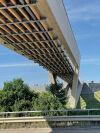Due to large-scale industrialization of the city, the connection between city and land was lost in the second half of the last century. The wooden Diekloper is the final piece in the Marconi Buitendijks project, with the aim of reconnecting the city centre with the Wadden Sea and strengthening the sea dike. The new bridge stimulates the development of the port city of Delftzijl and forms an important gateway to the UNESCO World Heritage Site ‘the Wadden Sea’.

Wooden Diekloper Bridge
Wooden carpet to the sea

Exploring connections between city and sea

Connecting people to nature
The design strengthens the physical relationship between people and nature, by creating a direct route from the city to the beach, but at the same time intensifies the mental connection with the Wadden nature reserve. In order to accentuate the route to the sea, the part of the bridge above the road is shielded from the traffic underneath by means of two high wooden beams. The shape then follows the slope of the dike and offers a view of the beach and a panoramic view of the sea and the Eems Canal. Because the construction of the bridge is partly visible, the visitor experience is a unique contrast that slowly unfolds from closed to open as part of the road to the sea.

Creating a sustainable connection
Together with the engineering firm Miebach and the wood producer Schaffitzel, NEXT is working on innovations in wooden infrastructure. The application of the sustainable material wood shows the ambition and innovative working attitude of NEXT, in which sustainability and circularity are integrated into the architecture. In order to give the inhabitants of Delfzijl an important contribution to the project, the new name of the wooden bridge was chosen by means of a competition.






